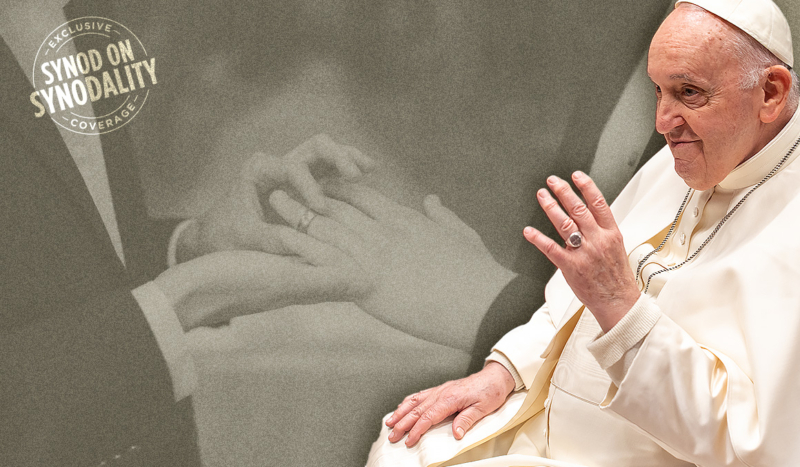
The Holy See’s official news agency Vatican News took the unusual step of publishing Pope Francis’ responses to five “dubia” (doubts) presented by five cardinals in July. One of the pope’s responses in particular is seen by many as opening the door to blessings for same-sex unions in some circumstances.
Francis’ responses were addressed to questions posed by Walter Cardinal Brandmüller, Raymond Leo Cardinal Burke, Juan Cardinal Sandoval Íñiguez, Robert Cardinal Sarah, and Joseph Cardinal Zen Ze-kiun on July 10 of this year. The pope’s responses were not in reply to the latest five “yes or no” dubia presented by the five cardinals on Monday, October 2, which remain unanswered.
The second of five questions presented by the cardinals was “about the claim that the widespread practice of the blessing of same-sex unions would be in accord with Revelation and the Magisterium.”
In his response, Francis stated that
the Church has a very clear conception of marriage: an exclusive, stable and indissoluble union between a man and a woman, naturally open to the begetting of children. Only that union is called “marriage.” Other forms of union are realized ‘in a partial and analogous way’ (Amoris laetitia 292), which is why they cannot be strictly called “marriage.”
For this reason, the pope added, “the Church avoids any type of rite or sacramental that could contradict this conviction and imply that something is recognized as marriage that is not marriage.”
He later explained, however, that “in dealing with people we must not lose pastoral charity, which must permeate all our decisions and attitudes.”
The “defense of objective truth is not the only expression of this charity, which also consists of kindness, patience, understanding, tenderness, and encouragement,” Francis added. “Consequently, we cannot become judges who only deny, reject, and exclude.”
“Therefore,” he wrote,
pastoral prudence must adequately discern whether there are forms of blessing, requested by one or several people, that do not transmit an erroneous conception of marriage. Because when one asks for a blessing, a person is expressing a request for help from God, a prayer to be able to live better, a trust in a Father who can help us live better.
In the passage in which Francis seemed most clearly (though still implicitly) to open the door to same-sex blessings, he wrote:
[Although] there are situations that from an objective point of view are not morally acceptable, pastoral charity itself requires us not to treat as ‘sinners’ other people whose guilt or responsibility may be attenuated by various factors that influence subjective imputability.
Francis added that such blessings “in certain circumstances may form part of pastoral prudence,” but should “not necessarily” become a norm.
“That is to say,” the pope explained,
It is not appropriate for a Diocese, an Episcopal Conference or any other ecclesial structure to constantly and officially enable procedures or rites for all types of matters, since everything “that is part of a practical discernment in a particular situation cannot be elevated to the category of a norm”, because this “would give rise to an unbearable casuistry” (Amoris laetitia 304).

